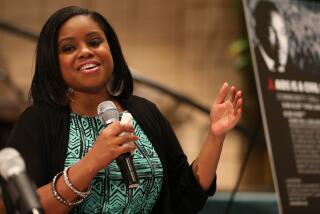Ashe Calls for Sensitivity From the Media : AIDS: He calls for new guidelines in dealing with the privacy of individuals, especially the seriously ill.
- Share via
WASHINGTON — It was a word he returned to over and over again, as if he were trying somehow to infuse it into his audience. Sensitivity. That is a commodity Arthur Ashe clearly feels is lacking in the working press.
“Are you going to be cold, hard, crass purveyors of the facts just for the sake of peoples’ right to know, under the guise of freedom of the press--or are you going to show a little sensitivity about some things?” he asked.
Six weeks after he disclosed that he is suffering from AIDS, his forum Tuesday was the National Press Club, and it was obvious that the opportunity to speak before such an audience was one he could not resist.
“I really wish to question your values (and) tweak your journalistic sensibilities,” he said.
“I am not easily rattled, as most friends would tell you about me, but I was very irritated and disappointed at being put in what amounted to a no-win situation: that is, to protect what I thought and assumed was a right any American had to keep personal matters private.”
The lecture on journalistic ethics had been simmering for nearly two months. Ashe, 48--who in 1975 became the first black player to win a men’s singles title at Wimbledon--has said repeatedly that he feels he was forced unwillingly into the public announcement because he believed that USA Today was about to print the story. And it is a story he still maintains is nobody’s business but his own.
But in venting his anger--albeit with wit and good humor--Ashe has joined an ongoing debate about the role of the media in releasing such a story about a well-known figure, particularly when the story involves AIDS, with its unique and often devastating social and political ramifications.
“I think there should be a debate on which individuals and conditions like this should be public knowledge,” he said. “If some sort of protocol or checklist or guidelines are reached as a result of intense public debate and an informal consensus arises, then I think we’re all on much more solid ground.
“But in the absence of a consensus, and there certainly didn’t seem to be one (regarding him), then I think something this private, this personal, that’s so much a part of one’s very being, should remain private,” he said.
There may be some instances where the public might have a right to know, if, for example, the individual was someone in a position of public trust, “from the President down to the conductor of the subway all the way out to the airport.”
And Ashe is not unaware that there is considerable public interest in his plight. But “just what are the parameters of privacy? What are they? Who sets them, and by whose authority are they issued?”
The seriously ill “want, above all, to feel that they have control over their lives. The control I have over my and my family’s life was substantially reduced when I was forced to go public,” he said. “It is precisely the prospect of seeing one’s entire persona on display--public display--that will keep other HIV-positive people from coming forward.
“I would hope that the so-called newsworthiness of that story will be tempered in the future with sensitivity.”
He singled out The Times for criticism, saying he was especially angered by an appearance by Sports Editor Bill Dwyre on CNN in discussing the criteria for publishing such a story.
“He was answering questions from callers, and in reply to how they decide what to print or who to expose, he said . . . ‘each story is different.’ There was no protocol, no check list, no primer, no rules (such as) one would find in the law or in medicine. Journalists are not licensed, do not have any boards to pass, no exams to be graded. In essence, Mr. Dwyre just sits there and brings his own set of cultural values to bear in deciding.”
Dwyre, told of Ashe’s comments, said: “I continue to take the stance that there’s a certain inevitability about being a public figure. That inevitability, I’m afraid, right or wrong, results in an erosion of some privacy. I have nothing but the most admiration for Arthur Ashe. But I maintain that the journalistic principles followed in this case were basically sound and fair.”
His current health, Ashe said, is good. But he knows this could change.
“I didn’t think I would be here now,” he said. “I remember when I first found out that I had AIDS, back in September ‘88, and reading everything I could get my hands on about it, as I did when I had my heart attack in ‘79, there was a rather sobering statistic thrown around in most of the articles. And it said that once a person is diagnosed as having clinically defined AIDS, nine out of 10 of them are not around in three years.
“And I just started to realize that I wasn’t sick. I was feeling all right. But then as I was coming up upon three years, I’m just sort of waiting for things to happen. And I finally just realized that the doctors just didn’t know.”
More to Read
Sign up for Essential California
The most important California stories and recommendations in your inbox every morning.
You may occasionally receive promotional content from the Los Angeles Times.













